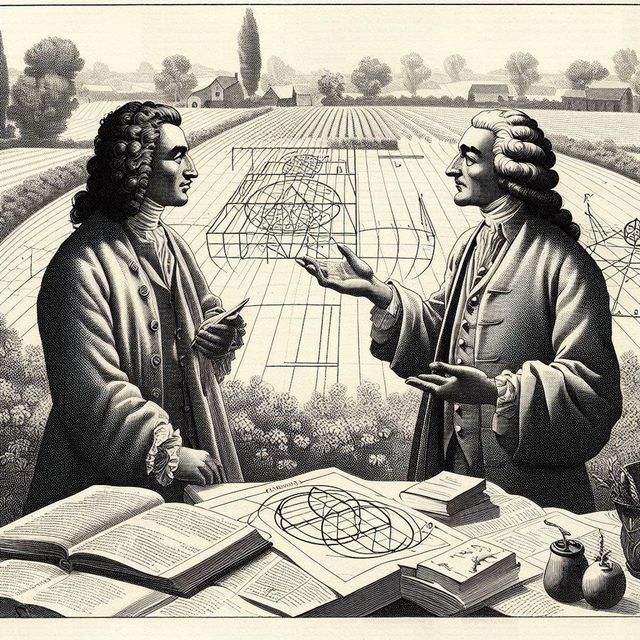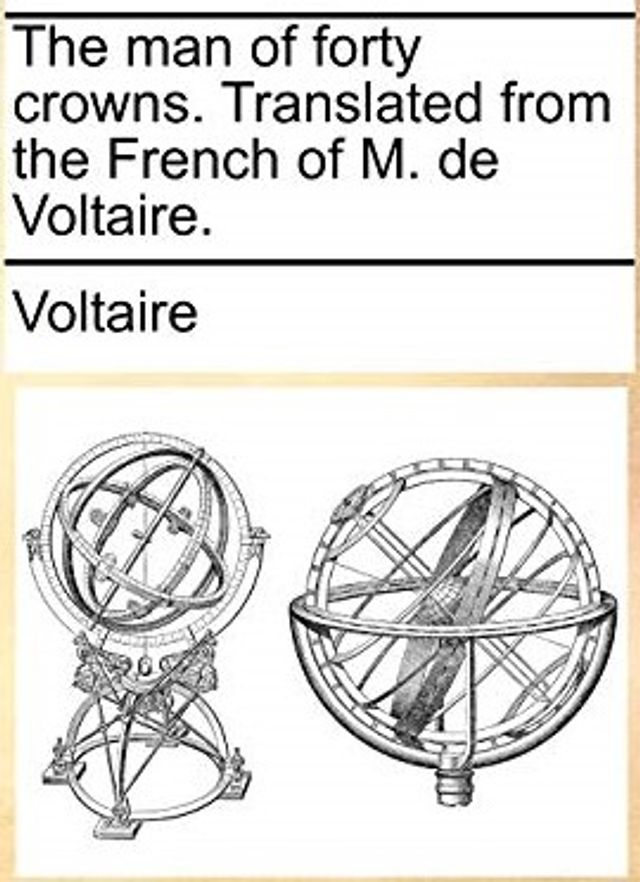-
Vijay Fafat
- Published on
This classic, mordant commentary on the prevailing economic system in France in mid 18th century showcases a very long dialogue of 20+ pages between the narrator and a “geometrician”, taken to mean a mathematician or an accountant good with numbers. In the process, the author has the geometrician display quick back-of-the-envelope estimations and calculations to illustrate points about economics, a nation’s GDP, the living requirements of a man over his lifetime, and the like. It makes for a very humorous read, enhanced by Voltaire’s characteristic twists of sarcasm and irony.
The piece starts off with an old man lamenting to the narrator about the Nation’s state of impoverishment compared to the days under Henry IV, the rising costs, the glaring income inequality, the substantial new wants of consumption in the populace and the fact that people have moved away from cultivation of land to trades of less demanding nature, like embroidery, with “day-laborer having raised the price of his work, many land-owners let their inheritances lie fallow.”
The conversation has a deep effect on the narrator, who is a land-owner who is drowning under the burden of state taxation. As he honestly starts proffering his plight in a long and moving Chapter II:
“I very readily make known to the universe that I have a landed estate which would yield me forty crowns a year, were it not for the tax laid on it. There came forth several edicts from certain persons, who, having nothing better to do, govern the state at their fireside. The preamble of these edicts was, “that the legislative and executive was born, jure divino, the co-proprietor of my land; and that I owe it at least the half of what I possess.”
It is in this state of mind that the narrator meets his Geometrician, whom he holds in extremely high regard. He readily admits that geometricians have a habit of subjugating with you with powerful arguments which may leave you without an ability to argue further, but also remain unsatisfied or unconvinced. He says (in a manner which exhibits Voltaire’s decent grasp on geometry and at least some Calculus):
“It sometimes happens that a man has no answer to make, and yet is not persuaded. He is overthrown without the feeling of being convinced. He feels at the bottom of his heart a scruple, a repugnance, which hinders him from believing what has been proved to him. A geometrician demonstrates to you that between a circle and a tangent you may thread a number of curves, and yet cannot get one straight line to pass. Your eyes, your reason, tell you the contrary. The geometrician gravely answers you that it is an infinitesimal of the second order. You stare in stupid silence and quit the field all astonished, without having any clear idea, without comprehending anything, and without having any reply to make. Consult but a geometrician of more candor, and he explains the mystery to you. “We suppose,” says he, “what cannot be in nature, lines which have length without breadth. Naturally and philosophically speaking, it is impossible for one real line to penetrate another. No curve, nor no right line, can pass between two real lines that touch one another. These theorems that puzzle you are but sports of the imagination, ideal chimeras, whereas true geometry is the art of measuring things actually existent.”
And from there, the conversations goes through a sparkling exchange between the narrator and the Geometrician, where the Geometrician illustrates a number of economic principles, aspects of governance, the state of affairs under Henry IV, ending in a comparison of taxation systems in England, Switzerland, China, Japan and the Republic of San Marino to show how the “sole taxation” system in France was completely unjust (and I suspect, Voltaire was playing phonetically on the word “sole” to mean “soul”). The conversation ends with the following sad exchange (and I suggest the reader go through the entire story first to appreciate it):
“THE MAN OF FORTY CROWNS: […] Now, was such a legislation, against which so many outcries were raised, and which caused the shedding of so many tears, much better than the newly imposed one, which at one stroke cleanly and quietly takes away half of my subsistence? I am afraid that on a fair liquidation it will be found that under the ancient system of the revenue they used to take, at times and in detail, three-quarters of it.
THE GEOMETRICIAN. Iliacos intra muros peccatur et extra. Est modus in rebus. Caveas ne quid nimis.
THE MAN OF FORTY CROWNS. I have learned a little of history, and something of geometry, but I do not understand a word of Latin.
THE GEOMETRICIAN. The sense is pretty nearly as follows: There is wrong on both sides. Keep to a medium in everything. Nothing too much.
THE MAN OF FORTY CROWNS. I say, nothing too much; that is really my situation ; but the worst of it is, I have not enough.
THE GEOMETRICIAN. I allow that you must perish of want, and I, too, and the state, too, if the new administration should continue only two years longer ; but it is to be hoped heaven will have mercy on us.
THE MAN OF FORTY CROWNS. We pass our lives in hope, and die hoping to the last. Adieu, sir; you have enlightened me, but my heart is grieved.
THE GEOMETRICIAN. This is, indeed, often the fruit of knowledge.”
There is a second part to this story, where the Man with Forty Crowns holds a discourse with a monk, but that is non-mathematical.
Voltaire was obviously a force to reckon with in those days and his thoughts carried weight. Given the antiquity of this piece, it may be of interest to note a couple of contemporaneous thoughts on Voltaire’s “Forty Crowns”:
A reviewer wrote in “The Monthly Review, Or, Literary Journal”, 1758 (ed. Ralph & G. E. Griffiths):
“This work comes down more to the level of common sense, and contains shrewd but rambling observations on modern government, religion , sciences , and manners”
[…]
“Mr. Voltaire takes the opportunity of making his remarks, by giving unconnected anecdotes of the life of a man who is supposed to have a landed possession of forty crowns annual value ; which being heavily taxed on the principle that everything springs from land, occasions a comparison between the hardships of landed men , and the unjust exemptions enjoyed by persons of monied property : and this well known writer has a peculiar art of exhibiting striking contrasts. We have two dialogues between the man of forty crowns and a geometrician ; the first on political philosophy , which is too long to extract; and the latter on the philosophical systems of generation, which though humorous, is too indelicate for any.\ other place than where it is.”
Another reviewer wrote in 1797 in “The Analytic Review” (while reviewing another book, “The Essential Principles of the Wealth of Nations - opposition to some false doctrines of Dr. Adam Smith” by John Gray, 1797):
“They whose minds have been pre-occupied with the expediency and rectitude of the present system of taxation […] and with the notion of a vast income arising to the date from manufactures, have expressed great surprise and astonishment at the conclusions of the economists, that the public supplies ought to be drawn wholly and directly from the rents of land or from the surplus produce of lands ; that is, that there should be no tax but a land tax. This doctrine has been attacked by ridicule as well as by ferocious argument, both on the continent of Europe, and in our island: in the former by monsieur Voltaire, in his Man of Forty Crowns and […]”


